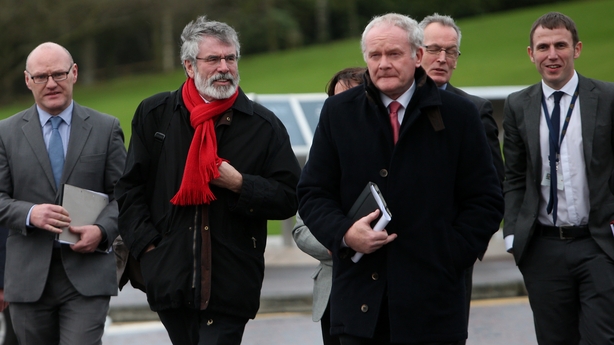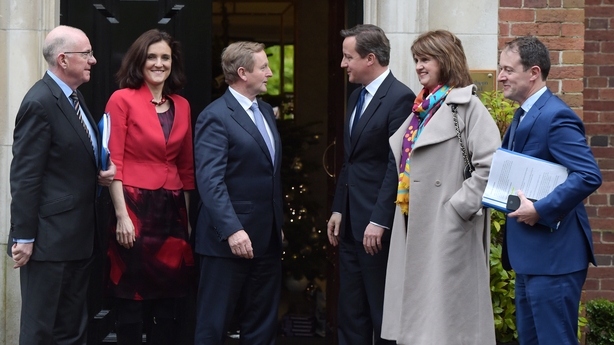A breakthrough in crunch talks aimed at breaking the political logjam in the North is still a long way off, the Democratic Unionists have warned.
DUP negotiator Jeffrey Donaldson tonight downplayed the chances of a deal materialising within the next 24 hours after emerging from the first round of intensive negotiations with Taoiseach Enda Kenny and British Prime Minister in Belfast.
Talks continued past 9pm with politicians set for round table discussions late into the night.
The discussions are anticipated to break up at some point through the night and resume in the morning.
Both leaders have cleared their diaries through to tomorrow afternoon in a bid to find a way forward on a range of thorny disputes that are causing gridlock in the power-sharing administration.
"I think there is still a long way to go on this one, there are substantial issues to be resolved but we are here to try to achieve an outcome," Lagan Valley MP Mr Donaldson said outside the talks venue at Stormont House.
"I don't think anyone should get too excited about the prospect of an agreement within the next 24 hours, having said that we will do our best to close the gaps where they exist."
He added: "We are prepared to come back here next week if it is clear that progress can be made to resolve the outstanding issues."

Earlier, Sinn Fein Deputy First Minister Martin McGuinness said the onus was on Mr Cameron to stump up extra funding to address problems he insisted were particular to the region.
As well as long-standing disputes over flags, parades and the toxic legacy of the past, the five parties in the power-sharing Stormont coalition are trying to reach consensus on budgetary problems facing the devolved institutions, particularly the impasse over the non-implementation of the British government's welfare reforms in Northern Ireland.
Ministers in Belfast have already had to ask for an emergency £100m (€127m) loan from the British Treasury to balance their books this financial year, and if a deal on welfare reform is not agreed they will face around £200m of penalties for non-implementation.
As it is unlikely the administration would be able to absorb such a financial burden, the future of the devolved Executive effectively depends on a resolution to the welfare reform impasse.
Mr Donaldson said a deal on the budget was vital.
"The other things can't be delivered without resolving the financial question," he said.
He said if an agreement was not reached Stormont would collapse, resulting in a return to direct rule and, with it, the likely imposition of policies the Executive has so far resisted, such as water charges.
"What's the alternative (to an agreement) - the alternative is this place comes crashing down," he said.
Flanked by Sinn Féin leader Gerry Adams, Mr McGuinness said all five parties were in agreement that the British government had to make more of a contribution financially to Stormont.
"We have reached agreement on what this British government needs to do in budgetary terms," he said.
"We are going, through the course of this negotiation, to make the case - this place here is different, this is not the north of England, this is not London, this isn't Scotland and this isn't Wales.
“We are a society emerging from conflict and legacy of all of that has posed huge problems for our Executive, not least in terms of how we bring our community together, how we build a united community, how we increase sharing in education, how we deal with the whole reconciliation process - special problems that aren't faced by any other region in these islands."
Mr McGuinness also reiterated his party's view that a deal could only be struck if agreement was found on all the outstanding issues.
"I think anything less than a comprehensive agreement will be seen through by people as being lacking in substance," he said.

Arriving for the talks, Mr Kenny and Mr Cameron were optimistic progress would be made.
"We do hope, during the course of discussions today, possibly tomorrow, to make progress," Mr Kenny said.
"Hopefully we can reach a conclusion on a number of matters that are important for Northern Ireland and for the relationship between Northern Ireland and the Government in the Republic."
Mr Cameron urged Stormont’s political leaders to strike a deal on outstanding disputes for the sake of the people who live in the North.
He also expressed optimism an agreement could be reached.
"We have got to demonstrate we can resolve these issues," he said outside Stormont House.
"The people inside this room will be discussing and talking about them but the people outside the room, they are the people that matter. They want to see their politicians deliver."
Mr Kenny arrived at Stormont House shortly after Mr Cameron and Northern Ireland Secretary Theresa Villiers.
The Taoiseach was joined by Tánaiste Joan Burton, Foreign Affairs Minister Charlie Flanagan and Minister of State Sean Sherlock.
First Minister Peter Robinson and Mr McGuinness have both set the weekend as an effective deadline for a deal.
Both men have conceded the chances of securing agreement after Christmas would be limited due to the inevitable hardening of political positions in the run-up to the British general election.

